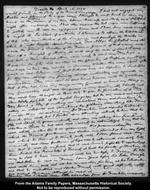April 16. 1778
would permit, in the Study of the French Language. I had not engaged any Master and determined to engage none. I thought he would break in upon my hours in the necessary division of my time, between Business, and Study and Visits, and might often embarrass me. I had other reasons too, but none were sufficient to justify me. It was an egregious Error and I have seen cause enough to regret it. In Stead of a Master I determined to obtain the best Advice of those who were Masters of the Language, and purchase the Books in which it was taught upon Principle. Two Abbys, De Chalut and Arnoux, the former a Brother of the Farmer General of that name, and himself a Knight of Malta, as well as of the Order of Saint Louis, and both of them learned Men, came early to visit me. They had a House in the City and another in the Country at Passi, in our Neighbourhood, where they resided in Summer. Whether they were Spies of the Court or not I know not. But I should have no Objection to such Spies for they were always my friends, always instructive, and agreable in conversation. They were upon so good terms however with the Courtiers that if they had seen any thing in my Conduct or heard any thing in my Conversation that was dangerous or very exceptionable, I doubt not they would have thought it their duty to give Information of it. They were totally destitute of the English language, but by one means and another They found a Way of making me understand them, and sometimes by calling an interpreter and sometimes by gibbering something like French I made them understand me. Dr. Franklin was reported to speak french very well, but I found upon attending critically to him that he did not speak it, grammatically, and upon my asking him sometimes whether a Phrase he had used was correct, he acknowledged to me, that he was wholly inattentive to the grammar. His pronunciation too, upon which the French Gentlemen and Ladies complemented him very highly and which he seemed to think pretty well, I soon found was very inaccurate, and some Gentlemen of high rank afterwards candidly told me that it was so confused, that it was scarcely possible to understand him. Indeed his Knowledge of French, at least his faculty of speaking it, may be said to have commenced with his Embassy to France. He told me that when he was in France some Years before, Sir John Pringle was with him, and did all his conversation for him, as his Interpreter, and that he understood and spoke French, with great difficulty,untill his present Residence, although he read it.
Finding that I should derive little advantage from Dr. Franklin in acquiring
Page 2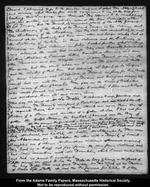
French, I determined to go to the fountain head, and I asked The
Abbys Chalut and Arnoux, what Books they would recommend to me, as the best for teaching their Language upon Principle? They appeared to be much pleased with this question, and immediately named the true Principles of the French Tongue, and the French
Synonimous Words of the Abby Gerard, The Dictionary of the Rules of the French Tongue in two Volumes, and The Dictionary of the
Accademy. This they said was undoubtedly the most correct as an Authority, but there were other and larger Works such as the Dictionary of Richeley in three Volumes and the Dictionary of Trevoux in Eight Volumes in folio. I asked further what Writings were esteemed the best models. They said Pascalls provincial Letters, Madam de Sevinnes Letters, Hamiltons Memoirs, and even the Thousand and one Knights were as pure French as any in the language, but they would advise me to read The Cardinal De Retts and the Writers of that time but especially L'Esprit de la Ligue in three Volumes and L'Esprit de la Fronde in five, for these Books would lead me into the History of France and bring me acquainted with many of their Characters. They gave me the Names of Booksellers who would furnish me with any books I wanted. I soon went to Paris and purchased them all and many more.
This day We dined at Mr. La Fret s. A splendid House, Gardens and Furniture. The Family were fond of Paintings and exhibited a Variety of exquisite Pieces, but none of them struck me more than one Picture of a Storm and another of a Calm at Sea. I had not forgotten the Gulph Stream, the English Channel nor the Bay of Biscay.
[The following three paragraphs were begun by JA as an interlineation in the MS and then continued on a separate sheet marked for insertion ahead of the entry of 17 April, below.] At this dinner the Conversation turned upon the Infrequency of Marriage in France. Go into any company they said and you would find very few who were married, and upon Examination of the numerous Company at Table I was found the only
Page a1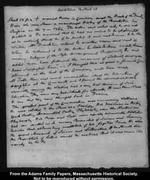
Addition to Sheet 13
married Person in Company except the Heads of the Family. Here We were shewn a manuscript History of the Revolution in Russia in the Year 1762. The Author was asked why he did not publish it. He answered that he had no mind to be assassinated as he certainly should be if he printed it and was known to be the Writer. Mr. Franklin retired to another room and read it. When he returned it to the Author he said to him made many Eulogies of the Style, Arrangement, Perspicuity &c. and added "You have followed the manner of Sallust, and you have surpassed him." -- I thought this as good a french Compliment as the best of the Company could have made.
At Table there was much conversation about the Education of daughters at the Convents, and I found the discreetest people, especially among the Ladies, had a very bad Opinion of such Education. They were very bad Schools for Morals. It was then News to me that they were thought such in France.
The greatest part of the Conversation was concerning Voltaire. He was extolled to the Skies as a Prodigy. His Eminence in History, Epick Poetry, Dramatick Poetry, Phylosophy, even the Neutonian Phylosophy: His Prose and Verse were equally admirable. No Writer had ever excelled in so many Branches of Science and Learning, besides that astonishing multitude of his fugitive Pieces. He was the grand Monarch of Science and Litterature. If he should die the Republick of Letters would be restored. But it was now a Monarchy &c. &c. &c.
April 17. Fryday. [1778]
We dined home with Company. Mr. Platt and his Lady, Mr. Amiel and his Lady, Mr. Austin, Mr. Alexander &c. There were two Alexanders, one a Batcheller, the other with a Family of several Daughters, one of whom Mr. Jonathan Williams afterwards married. They lived in a House not far from Us, were from Scotland, and had some connection with Mr. Franklin, which I never understood and took no pains to investigate.
After dinner We went to see the Fete de long Champ, or the feast of the long Field. This was good
Fryday. On this Week, all the Theatres of Paris
and are shutt up and the Performers forbidden to play.
Page 3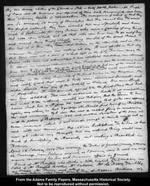
By this decree, whether of the Church or State, or both, All the fashionable People of Paris and its Environs are deprived of their daily Amusements and loose their ordinary
topicks of conversation. The consequence of which is that they are si ennuie, so weary of themselves that they cannot live. To avoid this
direfull calamity they have invented this new Spectacle and have made it fashionable for every Person who owns a Carriage of any kind that rolls upon Wheels, and all those who can hire one to go out of Town and march their Horses slowly along one side of the great Road to the End of it, then they
[illegible] come about and return on the other Side, and in this manner the Carriages are rolling all day. It was asserted on that day that there was not a pair of Wheels left in the City. For some Years, the Ladies who were not acknowledged to have established reputations, were observed to appear in unusual splendor in these Processions, and the indecency increased from Year to Year till one of the most
beautifull but one of the most infamous Prostitutes in Paris
had sold her Charms to such profit that she appeared in the most costly and splendid Equipage in the whole Row: six of the finest horses in the Kingdom, the most costly Coach that could be built, more numerous Servants and richer Liveries than any of the Nobility or Princes. Her own Dress in Proportion. It was generally agreed to be the finest
Shew that had ever been exhibited. This was so audacious an Insult to all modest Women and indeed to the national morality and Religion, that the Queen to her honor sent her a Message the next morning, that if she ever appeared again,
any where, in that Equipage she should find herself in Bic tre the next morning. Yet even this was a modest fancy in comparison with the palace of Bellvue. This was another Symptom of the pure virtuous manners which I was simple enough to think would not accord with our American Republican Institutions. To be sure it had never yet entered my thoughts, that any rational Being would ever think of demolishing the Monarchy and creating a
Republick in France.
April 18. Saturday. 1778.
This morning, the Father of General Conway, a venerable Personage from Ireland originally as I presume, came to visit me and enquire concerning his Son and American Affairs in General.
Dined at Mr. Bouffets, who spoke a little English. The Company consisted of Mr. Bouffets Brother, Mr. Veillard, Mr. Le Fevre, The Abbe des Prades, Mr. Borry and others.
On our return called and drank Tea, at Madam Brillions. We
Page 4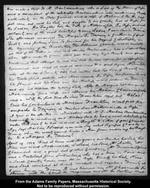
then made a Visit to M. Boulainvilliers, who is Lord of the Manor of Passi and a descendant of the celebrated Boulainvilliers who wrote many Books particularly on the States General and a Life of Mahomet &c. He had just come out with his Lady and daughter to his Country Seat at Passi, for the Season. His Daughter bore the Title of Mademoiselle De Passi, and was certainly one of the most beautiful young Ladies, I ever saw in France. She afterwards married The
Marquis De Tonnere, a Gentleman of great Quality and fortune, since so famous for his tragical Catastrophy in the beginning of the Revolution. This Noblemans Character was as amiable as that of his Father in Law was otherwise. Boulainvilliers held a superb hereditary office under the Crown which gave him very high Rank and great Emolument. But although he was very rich he was represented as oppressive, tyrannical and cruel as well as avaricious to a great degree. Mr. Franklin who at the age of seventy odd, had neither lost his Love of Beauty nor his Taste for it
[illegible] called Mademoiselle De Passy his
favourite and his flame and his Love and his Mistress, which flattered the Family and did not displease the young Lady. After the Marquis had demanded Mademoiselle for a Wife and obtained her, Madam Chaumont, who was a Wit, the first time she saw Franklin cryed out "Helas! tous les Conducteurs de Monsieur Franklin, n'ont pas pu empeche le Tonnere de tomber sur Mademoiselle de Passi." A Year or two after this in conversation with Mr. De Marbois, Boulainvilliers happened to be mentioned, and Marbois said he had a most detestable Character. But said I, he has married a Daughter to a Man of good Character. Aye, says Marbois, I suppose you will say what signifies Character in France, when the worst cannot hinder a Man from marrying his Daughter to a Marquis De Tonnere?
April 19. 1778.
Dined at home with Mr. Grand, our Banker, his Lady, his Niece and Ward Mademoiselle L'Abhard, his Sons, Mr. Austin, Mr. Chaumont and a great deal of other Company. Mr. Ferdinand Grand was a Protestant from Switzerland, who had a House in Paris and a small Country house near Us in Passi. Himself, his Lady, Niece and Sons composed as decent, modest and regular a Family as I ever knew in France. It was however by Mr. Chaumonts Influence with the Count De Vergennes and Mr. De Sartine that

